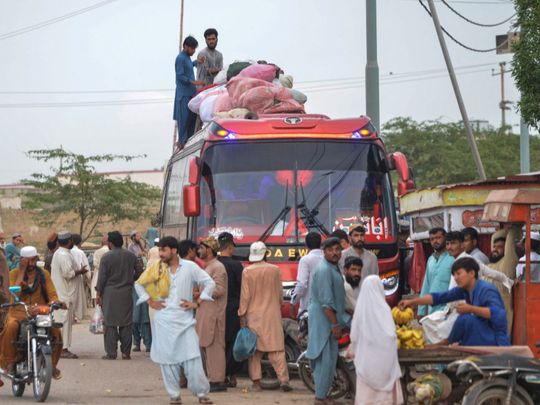
ISLAMABAD: Hundreds of thousands of Afghans living illegally in Pakistan have been given until November 1 to leave voluntarily or face deportation, the interior minister said Tuesday, a crackdown Kabul’s embassy in Islamabad called “harassment”.
The order comes as Pakistan grapples with a rise in attacks the government blames on militants operating from Afghanistan, a charge Kabul routinely denies.
Around 1.3 million Afghans are registered refugees in Pakistan and 880,000 more have legal status to remain, according to the latest United Nations figures.
But caretaker Interior Minister Sarfraz Bugti said a further 1.7 million Afghans were in Pakistan illegally.
All will have to return home in the coming months, according to a report by the state-run news agency APP.
“The illegal immigrants and illegal foreign nationals who are living in Pakistan are given a deadline of November 1,” Bugti told reporters in Islamabad.
“If they do not go... then all the law enforcement agencies in the provinces or federal government will be utilised to deport them.”
APP went further, citing government sources as saying the government wanted all Afghans to leave.
“In the first phase, illegal residents, in the second phase, those with Afghan citizenship, and in the third phase those with proof of residence cards will be expelled,” it said.
Waiting lists
In a statement posted on X Tuesday, Afghanistan’s embassy said more than 1,000 Afghans have been detained in the past two weeks — half of them despite having a legal right to to be in Pakistan.
“Despite the repeated promises of the Pakistan authorities, the arrest and harassment of Afghan refugees by the police in Pakistan continues,” it said.
Bugti said also that from November 1, Pakistan would only allow entry to Afghans with valid passports and visas.
For years, Afghans entering Pakistan through land borders have been allowed to use their national identity cards as a travel document.
There is a huge waiting list in Afghanistan for nationals seeking to get passports, and obtaining a Pakistan visa can take months.
Bugti also warned of a crackdown on property and businesses owned by Afghans in Pakistan.
“A task force has been formed for that purpose at the interior ministry. All the properties and businesses of those living here illegally are out of our tax net,” he said.
“Our intelligence agencies will search them out and their business will be confiscated by the government.”
Afghans have poured into Pakistan in their millions during decades of successive wars, many living in refugee camps with restricted access to education, healthcare and employment.
An estimated 600,000 have arrived since the Taliban seized power in Kabul in August 2021 and imposed their austere version of Islamic law.
Many are seeking asylum in third countries.
Relations between Pakistan and Afghanistan have soured since the Taliban’s return, with a sharp rise in militant attacks along Pakistan’s border.
“There have been 24 suicide attacks since January, 14 of these 24 were carried by Afghan nationals,” Bugti told reporters.
Pakistan has launched crackdowns on Afghans in the past and threatened to deport them all, but the campaigns have fizzled out after a few months, or following talks between the respective capitals.












